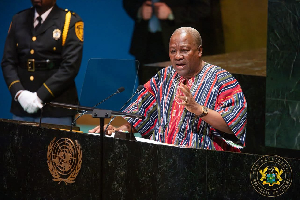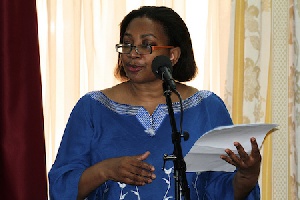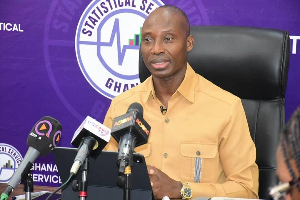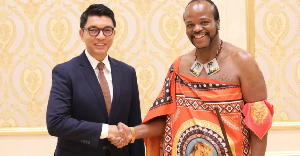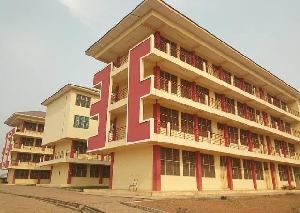The Ghana Integrity Initiative (GII) has called on the government to release the report on the investigations carried on the former head of the Commission on Human Rights and Administrative Justice (CHRAJ) Lauretta Lamptey.
The commissioner, who stepped down to allow investigations to take place, was accused of splashing over $200,000 on rent at the AU Village and about Gh¢180, 000 on the renovation of her official residence.
The anti-graft body said: “The long silence is worrying and many Ghanaians may give different interpretations to this silence. But whatever interpretations people give to this silence, the Commissioner, on her part, and the Ghanaian tax payers deserve justice and the silence on the matter does not serve this purpose.”
Below is the full statement from the GII Executive Director Vitus A. Azeem:
JUSTICE DELAYED IS JUSTICE DENIED: THE CASE OF THE COMMISSIONER OF CHRAJ
“In recent times, the John Mahama-led administration has yielded to pressures to investigate allegations of corruption and other types of malfeasance against various public officers. These investigations included the Judgment Debt Commission, the Brazil 2014 Commission, EOCO investigations into the operations of GYEEDA and the so-called investigations into the Subah Info Solutions saga, among others. The pressures for action have often come from civil society organizations, the media, social commentators and a cross section of citizens across the political divide interested in promoting transparency and accountability.
“However, most of these Commissions of Inquiry have taken longer than expected to carry out their investigations, often for no obvious reason. Even when the delayed investigations have finally been completed and the reports submitted, it takes a lot more time to take action on the recommendations of these Commissions. Sometimes, no action is taken at all on the recommendations and public officers that have been indicted remain in their positions, monies stolen remain unrecovered and recommended prosecutions never take place. Furthermore, citizens whose hard earned money is used to pay for the costs of these investigations never get to see the reports of these commissions due to the lack of transparency and openness that underline such investigative processes. This raises a lot of questions and concerns.
“The inaction by the President on reports of Commissions of Inquiry and other investigations may be attributed to several factors, including political pressures from party financiers and faithfuls who are indicted. Pressures may also come from involvement of people high up in the party or government who feel threatened by further revelations if action is taken against the indicted officers or who feel that their indicted tribesmen should not be penalized for the improprieties or possible benefits of the ruling party from the improprieties.
“However, one must not assume that everybody against whom allegations of corruption have been made would have been indicted by these Commissions and Committees and they are all necessarily guilty. It is, therefore, important in the interest of transparency, accountability, justice and fair play to publish the reports of the investigations and act on the findings. Citizens need to know the results of these investigations, particularly those who have been cleared, those who have been indicted and the proposed recommendations arising from the findings of the investigations.. But, more importantly, we need to know why they have been cleared or found guilty. The reports must be published and the Attorney General should take the necessary action against those who have been indicted.
“It is unacceptable for any arm of government to yield to political pressures when it comes to addressing governance issues but it is even worse when citizens perceive the Judiciary to yield to such pressures or even fall victim to other factors such as corruption in its various forms. Following the allegations of impropriety by the Commissioner of the Commission for Human Rights and Administrative Justice (CHRAJ), Ms Lauretta V. Lamptey, and a formal complaint made against her, President John Dramani Mahama, “on the advice of the Judicial Council and pursuant to Article 146 (10) (b) of the 1992 Constitution of Ghana, suspended from office, Ms. Lauretta V. Lamptey, Commissioner for the Commission on Human Rights & Administrative Justice (CHRAJ).” The statement suspending her stated that “the suspension follows the establishment of a prima facie case against Ms. Lamptey by the Chief Justice and the setting up of a five (5)-member committee to investigate complaints made against her.” This seems to have been al that most Ghanaians heard about the case.
“Many Ghanaians saw this as a sign of adherence to the Rule of Law and expected prompt investigation of the matter so that justice will not only be seen to be delivered but actually delivered. However, eight months down the year, nothing has been heard from the Committee or the Chief Justice. The continued silence of the Committee and the Chief Justice on the matter seems to be telling Ghanaians that the Judiciary could be going down the same lane as the Executive. The Committee was set up because justice needed to be served and the Commissioner needed to be given the chance to be heard. However, the long silence is worrying and many Ghanaians may give different interpretations to this silence. But whatever interpretations people give to this silence, the Commissioner, on her part, and the Ghanaian tax payers deserve justice and the silence on the matter does not serve this purpose. It is often said “Justice Delayed is Justice Denied” and this seems to be the position with this case
“If Ms. Lauretta V. Lamptey has been cleared, she should be restored to her position as the Commissioner of CHRAJ and if she has been found guilty, the necessary sanctions should apply. Justice cannot afford to be delayed, especially by the Judiciary.
“As part of its anti-corruption mandate, GII, therefore, calls on the Chief Justice to display the independence and the incorruptible nature of Ghana’s Judiciary by releasing the report if it is ready or by informing Ghanaians why the investigations have still not been concluded. This is the only way to go if the Judiciary hopes to maintain its credibility.”
Signed
Vitus A. Azeem
Executive Director – GII
General News of Wednesday, 26 August 2015
Source: starrfmonline.com
Release report on CHRAJ boss’ probe - GII
Entertainment
